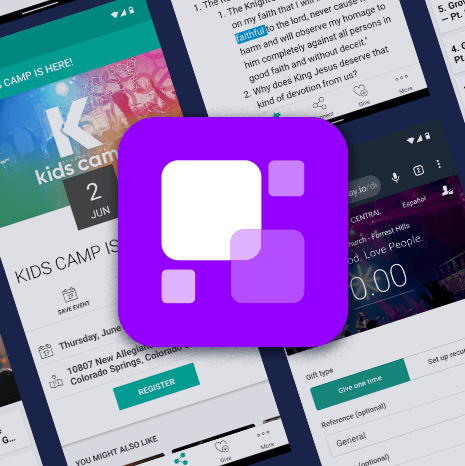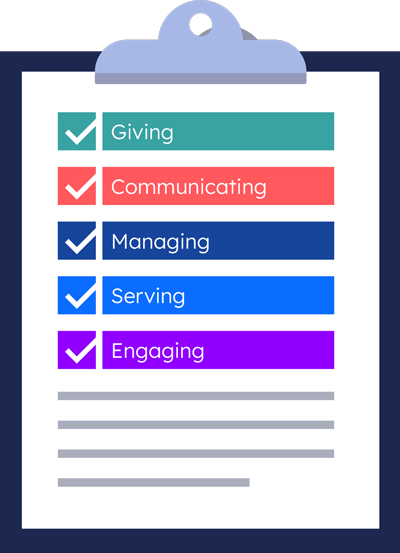5 Parish Process Ideas To Effectively Disciple New Church Members
March 20, 2024 |
Discipleship is the heart of the Church’s mission. It’s a lifelong journey of faith formation, and it begins with a warm welcome and intentional follow-up with new parishioners. As parish leaders, you’re tasked with the crucial role of guiding these people in their journey. Here are five process ideas to help you onboard new parishioners and foster a community excited to engage in discipleship.
Catholic Resources for Parish Leaders
Tools designed to help you guide your parishioners with grace and conviction.

1. Onboard With A Welcome Breakfast
It’s a big step when a new parishioner joins your community. It means they’re ready for a conversation and eager to learn more about your parish. Help them navigate the new process by providing clear instructions so that they know what to expect. For example, once they’ve taken the time to complete and submit a new member form, they’ll want to know when they’ll hear from you. On your form, make it clear that you’ll follow up within three days and be sure that you have an internal process in place that instantly notifies your staff when a new parishioner signs up.
The next step in this process should be a welcome breakfast designed especially for new parishioners. The goal of this event is to introduce them to your parish leadership, mission and vision statements, and your ministries. Make sure to pair each new member with a trained mentor who can answer questions and provide guidance during the day and throughout their journey. Work closely with your mentors and share the details from the parishioner form with them. It will equip your mentors to understand what path to recommend to a new parishioner and how to effectively disciple them. For example, if a new parishioner isn’t Catholic, a mentor will immediately provide them with information on OCIA or a small group. But if a mentor is assigned to guide a fully initiated new parishioner, they might recommend information to a liturgical ministry.
2. Matching Time and Talent With Service Opportunities
Service is an essential part of discipleship. Whether it’s volunteering at the food pantry or singing in the choir, service allows new parishioners to contribute meaningfully while fostering a sense of belonging.
To effectively engage them in service roles that resonate with their talents and interests, create a simple form to capture key information such as personal strengths, previous volunteer or professional experiences, skills, and weekly availability. Make the form accessible through your website or on your mobile church app.
By gathering this data, your staff can better match individuals with service opportunities that align with their capabilities and schedule. Once you’ve collected their responses, they can be automatically organized into your church management software. Set up a process that notifies your ministry leader about new talent and recommend that they connect with the parishioner within three days to discuss how they can contribute their time and talents. Work closely with your leaders to ensure that your new parishioners are set up for success in their discipleship journey.
Another strategy is to organize ‘meet and serve’ events that bring members together in a shared spirit of service. Some of your members may not be ready to fill out a form and make a commitment. These events are simply designed to foster a sense of community and also provide a platform for individuals to connect and collaborate while making a positive impact.
3. Small Group Integration
Small groups is a great way for a new parishioner to get to know your parish. They play a vital role in fostering faith and relationships. By welcoming new members into these intimate settings, individuals can delve into their faith in a secure and supportive atmosphere, nurturing deep connections with fellow parishioners and aiding in their spiritual development.
Small group leaders can leverage the convenience of a mobile church app to create a more integrated community experience. Members can engage in forums, sharing insights and discussing faith-related topics even when they’re not physically together. Additionally, features such as push notifications ensure that members are aware of upcoming events and group discussions, which can significantly increase participation rates. Check-in functionalities offer leaders a way to keep track of attendance and reach out if they notice patterns of prolonged absence or disengagement. This proactive approach underscores the care and personalized attention that small groups offer.
Start this process by creating a QR code to download your mobile church app. Encourage new members to download your app and join in small group discussions. Direct your members to check-in each time they attend. Be sure to communicate your group’s schedule and upcoming parish events.
Tour our Parish
Apps Product
Grow into the future with a mobile-first strategy.

4. Spiritual Retreats—Invite and Follow-Up
Retreats provide a break from daily routines to concentrate on spiritual development. Create a sign-up form and a QR code to make it easy for anyone to access. Utilize bulletins, social media, and pulpit announcements to ensure that everyone knows about the retreat opportunities. Actual testimonials from previous attendees highlighting their positive experiences can be incredibly persuasive.
Make an effort to reach out personally to new parishioners, either through a friendly email or a face-to-face conversation after Mass. Offer scholarships or discounts, especially to those attending for the first time. This gesture not only demonstrates the inclusive nature of your parish community but also removes potential obstacles that may prevent someone from participating.
Assign a priest, seminarian, or a deacon to follow up with participants for feedback after the retreat. Encourage them to share their experiences with others and connect them with opportunities where they can continue their journey.
5. Regular Check-ins and Feedback Sessions
Discipleship is an ongoing journey, not a singular event. Consistent interactions and feedback sessions with new parishioners offer crucial insights into their needs and experiences. This data aids in customizing the discipleship process to stay pertinent and impactful.
Schedule regular check-ins with new parishioners. They serve a dual purpose: they affirm your parish’s commitment to individual spiritual growth and allow for the personalization of faith journeys. Whether through face-to-face meetings, phone calls, or even an email, these touchpoints are instrumental in building strong, trusting relationships . They provide a sense of belonging and offer leaders valuable feedback to refine their discipleship programs effectively.
Another option is to create effective surveys or feedback forms. The information can be pivotal in understanding the experiences and needs of new parishioners. Questions should be clear, concise, and relevant to their spiritual journey. The aim is to elicit responses that can directly inform and improve the discipleship process. To do this, consider employing a mix of qualitative and quantitative questions that cover a broad spectrum of topics, from the helpfulness of resources that you provided to the warmth of personal connections. It’s also beneficial to ensure anonymity to encourage candid responses and establish a regular rhythm for distributing these surveys to capture ongoing experiences, not just one-off impressions.
Church Tech Check for Parishes
This proprietary online assessment helps parishes understand how they rank in regards to what tech they use and how they use it.

Adjusting discipleship initiatives in response to feedback is crucial in fostering an environment where new parishioners can thrive. Upon collecting feedback, it’s important to analyze the data with an open mind and a willingness to evolve. This means looking for patterns or common suggestions that indicate where programs might be falling short. For example, if multiple individuals express a desire for more hands-on volunteer opportunities as part of their spiritual growth, your parish should consider integrating service projects into their discipleship approach. Changes could also involve introducing new study materials, adjusting the frequency of meetings to suit the group’s availability, or providing additional training for mentors to better address the specific challenges that new parishioners face. In making such adjustments, parishes demonstrate their dedication to serving their community and ensure that each person’s spiritual journey is respected and nurtured.
Discipleship is a journey that your entire parish embarks on together. By incorporating these processes into your approach to welcoming and integrating new parishioners, you strengthen not only the individual’s faith but the entire community. Remember, the key to discipleship is relationships, and it is through these connections that the love of Christ is most powerfully witnessed and shared.
Want to continue building a stronger foundation for your volunteers as they grow in discipleship? Download the 10 Steps To Give Every Volunteer What They Need. It explains why volunteers leave and what you can do to equip them for leadership and discipleship.
Featured Content
You May Also Like
